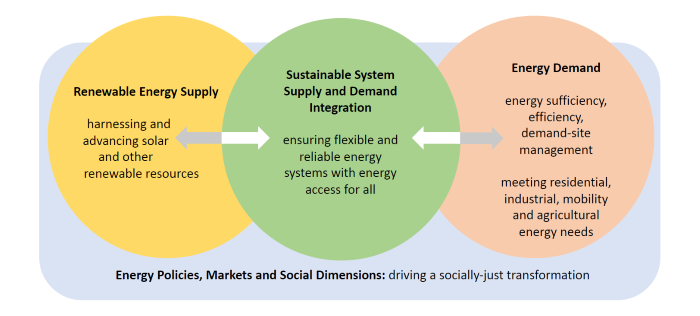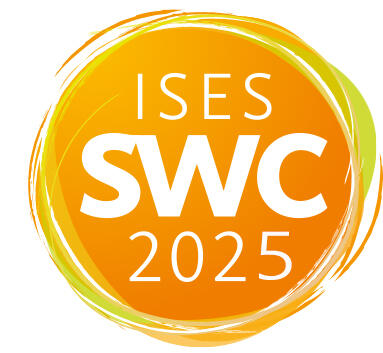SWC 2025 Call for Papers - submit your abstracts by 30 April
The abstract submission portal for the Solar World Congress 2025 is now open for you to submit your latest research and findings. We invite all authors to submit their abstract to the Solar World Congress 2025. Please use the SWC 2025 abstract template for your extended abstract (three pages max.). Visit the SWC 2025 Author Corner to learn more about how to submit your abstracts, or directly visit the abstract submission platform if you already have your abstract ready. Only abstracts submitted through the SWC 2025 abstract submission portal can be considered for review.
SWC 2025 will take place from 04 - 07 November 2025 in Fortaleza, Brazil and will be jointly organized by ISES, the International Solar Energy Society, and the official ISES Section in Brazil ABENS, the Brazilian Solar Energy Association. SWC 2025 will take place directly the week before COP30 in Belém, Brazil, just a few hours from Fortaleza, making SWC 2025 a important preparatory meeting to strengthen the voice of renewable energies at this crucial global event!
We cannot wait to receive your work and to welcome you to Fortaleza, Brazil in November 2025!
Conference Themes & Topics
The congress invites abstracts spanning the entire solar value chain, providing a platform to explore advancements, innovations, and emerging trends in solar energy. We welcome contributions across a broad range of areas, including solar technologies, applications and their end uses as well as policies, markets, and societal impacts. Submissions addressing innovative solutions, best practices, sustainability, and the role of solar and other renewables in shaping the clean energy transition are highly encouraged.

- Solar thermal power: Performance and optimization of solar thermal power system; Modelling, digitalization and AI; Collectors and components for solar thermal power; Thermal storage technologies and systems; Solar heating and cooling
- Solar heating and cooling: Performance and optimization of solar heating and cooling systems; Modelling, digitalization and AI; Collectors and components for solar heating and cooling;
- PV cell technology and PV systems: Advances in c-Si PV cells; Advances in thin films cells; Emerging and innovative PV cell technologies (i.e. Perovskite cells); Performance and optimization of PV systems; Modelling, digitalization and AI; PV system components; Concentration and solar tracking for PV systems; Hybrid PV-thermal systems (PVT); Energy storage technologies and systems
- Renewable resource assessment and meteorology: Solar resource forecast; Modelling, digitalization and AI; Meteorological data applied to renewable energies; Instrumentation and measurement; Renewable energy forecast
- Beyond solar: other renewables and associated applications, components, simulation and analysis: Wind power systems; Micro-hydroelectric power systems; Biomass power systems; Geothermal power systems; Tidal power systems; Hybrid power systems; Green hydrogen and green ammonia; Solar fuels; Renewable systems applications
- Renewable systems applications: Concentrated solar power (CSP) applications; Cooking and other non-electric applications; Grid integration of renewable power systems; Floating PV; Agrivoltaics; Electric mobility and other uses of renewable energy for transport and mobility
- Microgrids and grid interaction: Monitoring and control of microgrids; Modelling, digitalization and AI; Smart grids; Grid integration of microgrids; Decarbonization of isolated systems; Integration of solar energy in architecture and urban planning
- Integration of solar energy in architecture and urban planning: Solar PV in buildings; Solar heating and cooling in buildings; Net-zero buildings; Renewable energy supply for buildings, neighborhoods and solar cities; Efficient buildings and cities; Thermal comfort in the built environment and bioclimatic architecture
- Market, economy, policies, environment and social aspects: Social, economic and environmental impacts of renewable energy; Renewable energy education; Climate resilience; Gender equity in renewable energy; Workforce development and jobs in renewable energy; History of the renewable energies; Strategies, scenarios, financing and policies for renewable energy; Life cycle assessment; Recycling and circular economy; Energy transition; Extreme weather and climate events; Renewable Energies & COP
Important Dates
- Abstract Submission Systems Opens: February 2025
- Abstract Submission Deadline: 30 April 2025
- Registration Opens: June 2025
- Author Notification: June 2025
- Early Bird Registration Deadline: 31 July 2025
- Author Registration Deadline: 31 July 2025
- Full Paper Submission Deadline: 22 October 2025
- Conference Dates: 04 - 07 November 2025
- COP30 in Brazil: 10 – 21 November 2025
- Full Paper review: late 2025
- Proceedings Publication: early 2026
